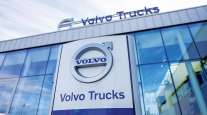Senior Reporter
Volvo Reports Modest Gains in Q3 Net Income, Revenue

[Stay on top of transportation news: Get TTNews in your inbox.]
Volvo Group reported a marginal increase in net income and a modest bump in revenue in the third quarter, citing slowing markets for trucks, construction equipment, and marine and industrial engines.
It also added a new business unit focused on autonomous, connected and electrified vehicles.
Listen to what Martin Lundstedt says about our new business area - Volvo Autonomous Solutions.
Want to know more? Read our press release: https://t.co/e33VOYN3qo#automation #autonomous #volvo #sustainability #safety #connectivity #electromobility #vera #construction #truck pic.twitter.com/vQHMzH8O51— Volvo Group (@VolvoGroup) October 18, 2019
For the period ended Sept. 30, Volvo — which reports in Swedish krona — posted net income of $780.5 million, or 38 cents per diluted share, compared with $777.5 million, or 38 cents.
Revenue reached $10.2 billion compared with $9.5 billion a year earlier.
The company’s operating margin slipped to 11% compared with 11.1% a year earlier.
The Gothenburg, Sweden-based company is the world’s second-largest commercial vehicle manufacturer.
“Demand for new vehicles is declining, and we are facing a period of tougher market conditions,” Volvo CEO Martin Lundstedt said in the earnings statement. “During the last couple of years, customers in Europe and North America have renewed and expanded their truck fleets. But with freight volumes having leveled off and with the current uncertainty about the future economic development, they are now holding back on investments.
“This is reflected in our order intake, which declined by 45% [globally] compared with the elevated levels, particularly in North America, last year,” he added.

Lundstedt
Truck orders in North America plunged 81% to 4,966 compared with 26,085 a year earlier.
Volvo Group’s North American brands are Volvo Trucks North America and Mack Trucks.
Lundstedt said he expected 2020 truck orders in Europe and North America to reflect more normal replacement demand.
Volvo’s Financial Services unit reported revenue increased 13% to $380 million, reflecting “the high portfolio level after some years of increased vehicle deliveries,” according to the company.
At the same time, Lundstedt said Volvo was preparing for the sweeping changes the transportation industry is expected to face in the years ahead.
To meet the challenge, Volvo announced a new business unit, Volvo Autonomous Solutions, whose focus is developing, commercializing and scaling up autonomous solutions across the group.
“Our industry is currently in a transformation phase, with focus on technologies such as connectivity, electrification and automation,” he said. “We have now passed a milestone with more than 1 million connected trucks, buses, and construction equipment delivered to customers around the world.”
In related news, Volvo Group Venture Capital AB announced it has invested in Upstream Security, an Israeli automotive cybersecurity startup. The investment will fund the development of systems to protect connected vehicles after the introduction of data-driven technologies.
Terms were not disclosed.
“The connected solutions bring increased uptime for our customers, better safety and opportunities to improve efficiency,” Lundstedt said. “Connectivity will also be an important enabler for autonomous solutions, and our customers are excited about the potential for improved efficiency our autonomous solutions can bring.”
Volvo’s investment is a direct result of its partnership with DRIVE, the innovation center that focuses on disruptive startups in the Israeli mobility sector. Market research shows that there will be substantial growth in the market for cybersecurity solutions for connected vehicles in the coming years, according to Volvo.
Want more news? Listen to today's daily briefing:




